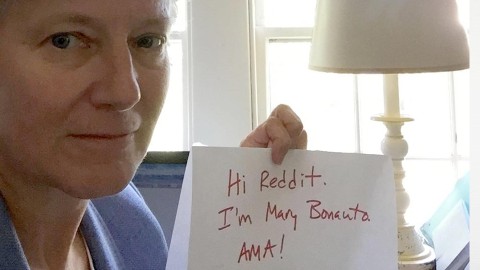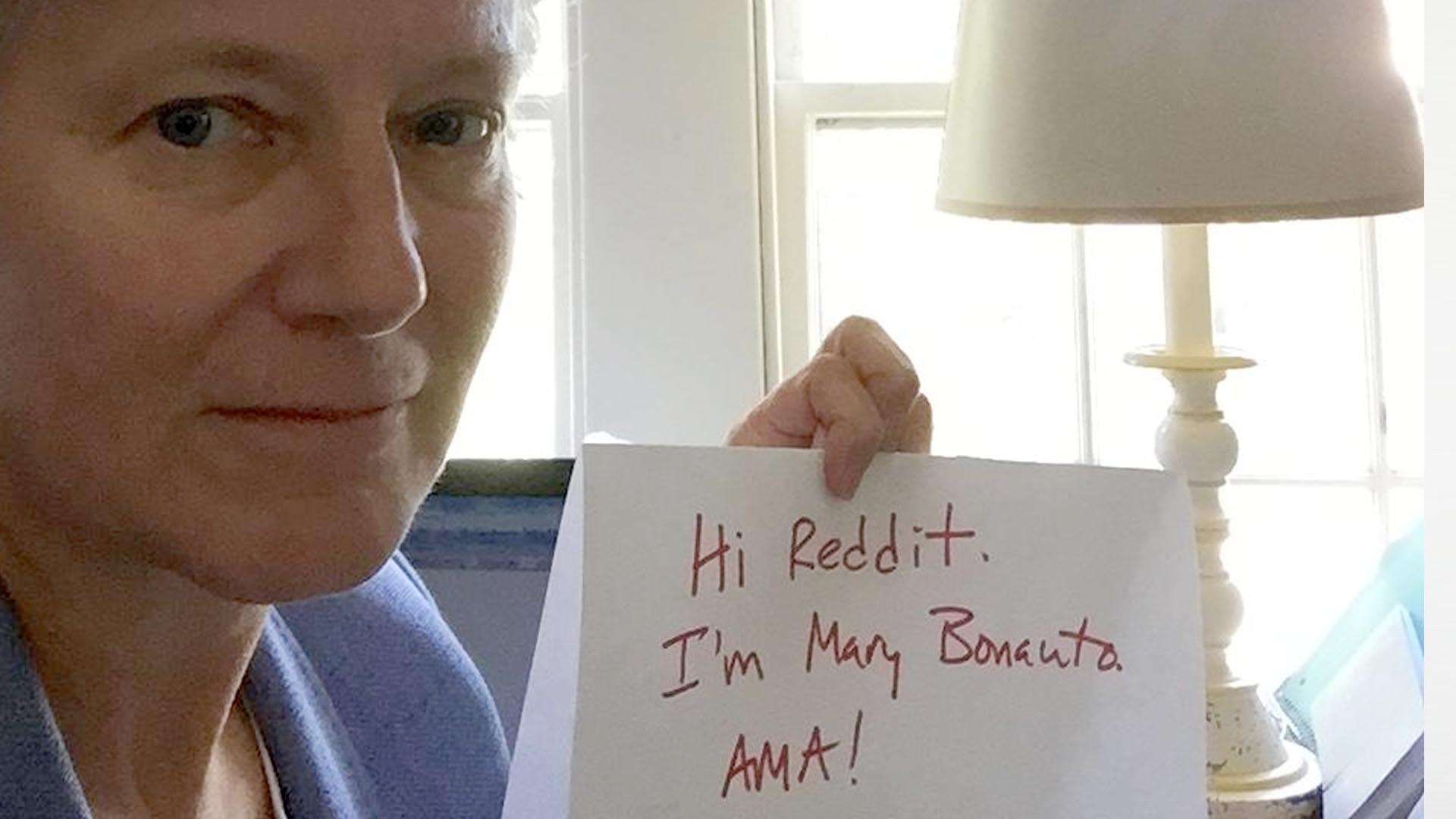
I’m Mary Bonauto, the Civil Rights Project Director at Gay & Lesbian Advocates & Defenders (GLAD). I’ve spent years litigating in the state and federal courts of New England on adoption and parenting, censorship, hate crimes, and discrimination in jobs and public accommodations. Two Vermont co-counsel and I won a 1999 ruling in Baker v. State of Vermont which led to the nation’s first civil union law, and I was lead counsel in the groundbreaking case Goodridge v. Department of Public Health, which made Massachusetts the first state where same-sex couples could legally marry in 2004. I also led GLAD’s federal court challenges to the Defense of Marriage Act (DOMA) in Gill v. OPM and Pedersen v. OPM, leading to the first federal court rulings against DOMA.
In 2015, I successfully argued before the U.S. Supreme Court in the historic case Obergefell v. Hodges, establishing the freedom to marry for same-sex couples nationwide. I am also a 2014 MacArthur Fellow.
Proof:
https://twitter.com/macfound/status/646716594249449472/photo/1
https://www.macfound.org/fellows/909/
http://www.glad.org/about/staff/mary-bonauto
The biggest opposition to the ruling seems to be that the Supreme Court has no right to decide something that doesn’t seem to be mentioned explicitly in the Constitution, something that the states should decide. The dissenting opinions of the justices were particular about that. How do you feel about those opinions?
The Supreme Court and courts in general have to interpret and apply laws written by legislatures as well as the state and federal constitutions. Courts decide many controversies that “are not specifically mentioned in the constitution.” Think cell phones, earlier marriage cases, drug sniffing dogs and so on. Our system of government is that the federal constitution is supreme. When a state or federal law contravenes constitutional principles, it is the job of the courts to say so. The Supreme Court is the final arbiter on the US Constitution. It is the law of the land and can only be changed by a federal constitutional amendment. This takes approval of 2/3 of each chamber and 3/ 4 of the states.
The majority declined to explain what scrutiny analysis it used to strike down the marriage laws. How do you think future litigants should approach other discriminatory statutes in the absence of a clear scrutiny analysis? What percentage of your argument preparation would you say focused on Justice Kennedy in particular? 50%? 90%? Did you assume that he would be the deciding vote?
The Supreme Court majority reiterated that marriage is a fundamental right and that gay couples can also exercise that right. Since marriage is a fundamental right, the Court applied strict scrutiny to the States’ justifications just as it has in other marriage cases. In future cases addressing equal protection claims, litigants are free to press the argument that rules/laws that distinguish among persons based on sexual orientation should get heightened judicial scrutiny. All 4 factors (although only 2 are key) were acknowledged in the opinion. (1) The Supreme Court discussed the history of discrimination against gay people. (2) It acknowledged some of the many ways gay people contribute to society, including as soldiers and parents. (3) It twice referred to sexual orientation as an immutable trait, which we understand to mean it is a deeply held characteristic and a part of a person’s identity they shouldn’t be forced to change to avoid discrimination. (4) As to political power, it described gay people’s situation as one that evolved from “outlaw” to “outcast” in the last 13 years. I assume federal and state courts alike are going to grapple with this question. It’s hard to look at the Obergefell opinion and say rational basis review applies to laws treating gay and non-gay people differently.
Many people across the states are citing religious liberty as a reason for not granting marriages to same sex couples, even after this ruling. What do you see as the next step? Do you believe that it’ll take laws made by Congress etc. for it to be fully sorted out?
No it doesnt take an act of Congress. One – it depends on context. People who work for the government have to do the work of the government. That means an individual employee can’t pick and choose who gets services based on their personal beliefs. If you can’t do your job and serve everyone, you should be re-assigned or leave. This nation respects freedom of religion. And it also respects the rule of law. Religion should not be inserted into the job of a government clerk. And if it is inserted, then where does it end. Should people be denied driver’s licenses or fishing licenses or hunting licenses because of a clerk’s beliefs about gender roles, or the sanctity of all life?
Will you tell us a little about your early career? What did you do for the first five or so years out of law school?
I was eager to get busy using my law degree to help people. I went into private practice in Maine and did lots of volunteer work, including on HIV issues. By the time Gay & Lesbian Advocates & Defenders (GLAD of Boston) hired me in 1990, I had done a fair amount of discrimination work. And my work at GLAD for the last 25 years has touched on nearly every aspect of life for LGBT people.
What do you think about Justice Robert’s dissent for the case?
I was disappointed and I wasn’t the only person to feel that way. But it shouldn’t have been a surprise since he forecast his views in the Windsor dissent from 2013. I was astonished to see Obergefell compared to the Dred Scott case where the Supreme Court refused to recognize the humanity of black Americans.
What do you think the next big Supreme Court case will involve? The freedom to marry whomever you want (thanks to you!) has just happened, and that was everyone’s “big” issue. What topic will take its place?
Hard to say. It could be a claim from an individual asserting that his or her personal beliefs allow him/her to act contrary to law, particularly to non-discrimination laws. It could be the reach of “sex” discrimination laws. Right now, sex discrimination includes sex and gender, and there are cases applying this to address discrimination against transgender people and gay people.
How do you feel about folks who choose not to uphold this ruling at a local level? What do you think appropriate action against such a person is for choosing not to uphold the law and the oath that was probably taken when that person came into that position?
Part of what makes difficult the situation in Rowan County Kentucky, where the Clerk refuses to issue marriages licenses to anyone now that the Supreme Court has ruled same-sex couples are eligible for marriage licensing, is that she is elected and can’t be removed from office. I understand that a judge ordered that other people in her office issue licenses. New reports from the ACLU indicate that she has instructed staff to alter the licenses issued so that they contain no reference to the county and are initialed rather than signed. This raises a question of the validity of the licenses. It will take some time for this to get sorted out. The bottom line is that the overwhelming majority of clerks in states across the country have had no problem doing their job as government officials – even clerks who agree with her in their hearts.
How closely did you work with the other oral arguers? I’m assuming you all worked as a team, but I’d be interested to hear about the logistics of such a large group of important lawyers come together for something like this.
We had a big team of lawyers overall and it was great. Each State had its own team of lawyers for the briefing I was working with terrific attorneys in Michigan. But once we were set for argument on Question 1 (the marriage question I argued) and Question 2 (the recognition of existing marriages, argued by Doug Hallward-Driemeier from Ropes & Gray), each of the teams had people who were part of larger conversations about the oral arguments. Doug and I worked to support each other and avoid any traps that would hurt the other’s case. It was super helpful to me to have an experienced Supreme Court advocate like him to talk to. Lots of people with expertise helped us out.


